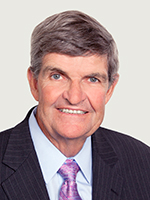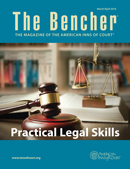Larry A. Hammond, Esquire
2015 Professionalism Award for the Ninth Circuit

 One of the country’s most esteemed criminal defense practitioners began his legal career because of a stutter. Many defendants in capital cases who would not otherwise have had legal representation have that small fact to thank for their access to justice.
One of the country’s most esteemed criminal defense practitioners began his legal career because of a stutter. Many defendants in capital cases who would not otherwise have had legal representation have that small fact to thank for their access to justice.
Raised in El Paso, Texas, by his traveling salesman dad and his church organist mom, Larry A. Hammond had no attorneys among family or friends, and no plans to attend law school. Having discovered that his severe stutter didn’t appear when he spoke languages other than English, Hammond had found himself a Spanish-speaking summer job and a college degree program in Russian. But when he transferred from the University of New Mexico to a more competitive department at the University of Texas, he began to stutter in Russian as well.
“Talking was very difficult for me,” Hammond says. “Many things in my early life were defined by the fact that I tried to avoid speaking in English. When I began to stutter in Russian, I decided to go to law school in order to address the challenges head on.
“I loved every minute.”
At UT law school, Hammond served as editor-in-chief of the Texas Law Review and was inducted into the Order of the Coif. Influential faculty such as federal courts professor Charles Allen Wright and torts professor Leon Green were instrumental in helping Hammond get his first clerkship, with Judge Carl E. McGowan of the U.S. Court of Appeals for the DC Circuit. Green was a particular influence:
“I loved him,” Hammond says simply. “Professor Green espoused the defense of the little man over the interests of government and corporations. He taught me that it was important for lawyers to help those without access to civil justice.” Although Hammond had “no interest in criminal justice,” Green’s influence would have a profound effect on Hammond’s career.
So did Justices Hugo L. Black and Lewis F. Powell, Jr., Supreme Court of the United States, for both of whom Hammond clerked from 1971 to 1973, an experience he describes as “like dying and going to heaven—an extraordinary pleasure.” He regards Powell, for whom he clerked two years, as the “father of professionalism.”
Hammond has been with the Phoenix firm of Osborn Maledon since 1974 after spending a year serving as an Assistant Watergate Special prosecutor. Hammond took a leave during the Carter Administration, to serve as First Deputy Assistant Attorney General in the Office of Legal Counsel where among other things he assisted with the task force negotiating for the release of American hostages in Iran. He began his death penalty work in 1981, and currently is involved 10 capital cases.
Hammond has served as chair of the Arizona Justice Project since 1998. The project has faculty coordinators at the law schools at Arizona State University and the University of Arizona, and at any given time has 20 to 40 students working on cases. The project has screened applications for assistance from more than 5,000 inmates and in recent years has secured the release of more than 20 individuals.
“It is a huge part of my firm, my law practice, and my life. The Project helps to ensure that the poorest of the poor have someplace to go if they have a legitimate claim of innocence,” Hammond says. Some of his most notable criminal defense cases include those of John Henry Knapp and Ray Girdler.
Although not a member of an American Inn of Court, Hammond embraces similar principles, and says that this Professionalism Award aligns with the goals he has had for his career. “I believe in doing things the right way and am mindful of lawyers’ ethical responsibilities at all times,” he says. Frequently an adjunct professor teaching law school courses on death penalty cases and claims of wrongful conviction, and working closely with students on the Justice Project, Hammond tries to pass those principles down.
“We must demand a high level of professionalism in this work,” he says. “So many of these [wrongful conviction] cases are built on the ineffectiveness or inappropriate conduct of other lawyers. While it is sometimes necessary to be critical of other lawyers, we take it very seriously and do it very carefully.”
Hammond attended the Celebration of Excellence in October with his grandson, a Marine who was then serving at the White House. “It was an unforgettable experience to return to the Supreme Court with him,” Hammond says. “It was profoundly moving.”
Jennifer J. Salopek is a freelance writer based in McLean Virginia.
© 2016 American Inns of Court. This article was originally published in the March/April 2016 issue of The Bencher, a bi-monthly publication of the American Inns of Court. This article, in full or in part, may not be copied, reprinted, distributed, or stored electronically in any form without the express written consent of the American Inns of Court.